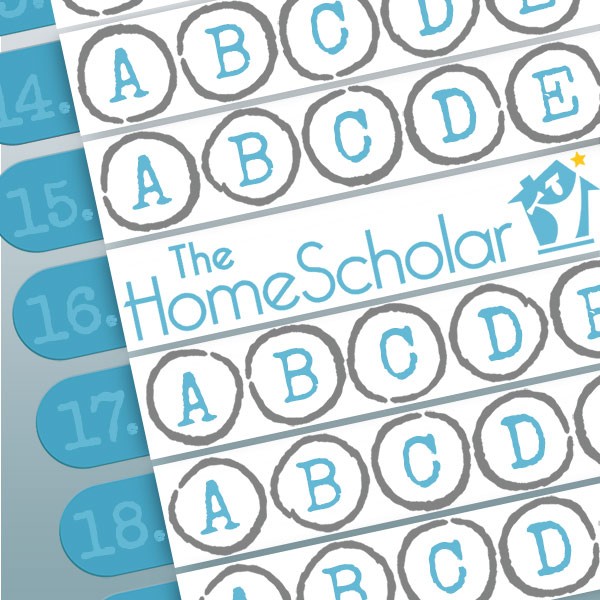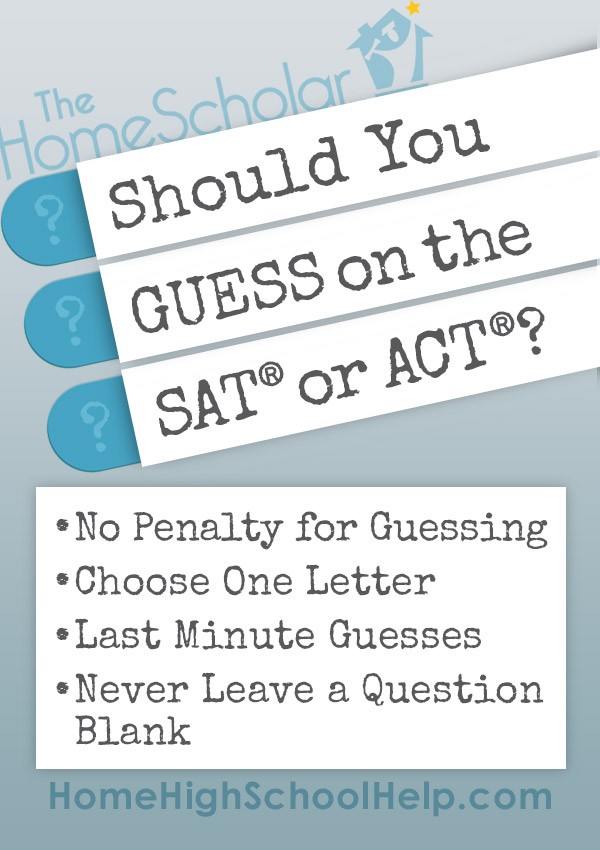Should You Guess on the SAT or ACT?
Let's talk about guessing on the SAT® and ACT® tests. Should you guess on the SAT® or ACT®? How should you guess, and why? Is there a penalty for guessing on the SAT® or ACT®? Let me shed some light on these important questions.
One of the hallmarks of my high school was teaching to mastery. When my children mastered a subject, they were ready to move on to something else. How did we know when they'd mastered a subject? It wasn't because we gave them a fill-in-the-bubble test, that's for sure.
Mastery means understanding, not bubble-filling. We were looking for their ability to problem-solve and use higher-order reasoning skills, which are better evaluated with short answer and essay test formats. In fact, if you look at homeschool high school curriculum, most testing materials use this type of format instead of multiple-choice, which works better with well-defined or lower order skills.
For parents who are used to teaching to mastery, the multiple-choice method used for college admission tests (SAT® and ACT®) can seem ridiculous or unfair. After all, students can actually get credit for guessing. Is that even ethical?! As a famous president said, "That question is above my pay grade." I leave it up to you to decide the ethics of test-taking for your student.
I do know, however, that the directions for the ACT® actually tell students to guess: "Answer every question. Your score on the tests will be based only on the number of questions that you answer correctly; there is no penalty for guessing. Thus, you should answer every question within the time allowed for each test, even if you have to guess."
Is There a Penalty for Guessing on the SAT® or ACT®?
You or your student may have wondered "Is there a penalty for guessing on the SAT® or ACT®?" Once again, there is no penalty for guessing on the SAT® or ACT®, which is why it's so important to go ahead and make best guesses. Don't skip questions. Don't leave any questions blank. On difficult questions, eliminate as many incorrect answers as you can, then make an educated guess among those remaining.
Leave No Blanks
If you leave questions blank instead of guessing, that can cause additional problems. Not only are the unknown questions blank, but leaving blank spots can cause the students to lose their place in the answer key. They may get other answers wrong just because they filled in the wrong bubble. Guessing keeps their place in the answer key. Complete the entire section entirely without blanks.
Choose One Letter
Answer every question, even if you are stumped. Pick a letter, any letter, and use that for every answer when you are stumped. Your scores on the multiple-choice tests are based on the number of questions you answer correctly. If unable to make an educated guess, and all answers seem equal, then choose one letter you will always use for the entire test. You can choose A, B, C, or D, but only choose one letter you will each time you guess for the entire test. If you have a first or last name with one of those letters, that's an easy way to choose your "guessing letter."
Last Minute Guesses
If students run out of time, they should use their chosen letter to answer any remaining questions quickly at the last minute. If students have extra time, they can return to the guessed answers. If they make a notation on the test packet, they can easily identify which answers to spend more time on.
Answer Every Question
Always guess if you don't know the answer. You are better off guessing, because you'll have a one in four chance of getting it right. If you leave an answer blank, you have no chance of getting it correct. There is no penalty for guessing, so guessing is better than a blank answer.
How Should Students Guess on the SAT® or ACT®?
If a student feels strongly about an answer, choose it and move on quickly. If a student is having difficulty with an answer, eliminate answers that are not correct, then guess between the remaining answers. If the student can't eliminate any answer, then choose their one "guessing letter" to answer every guess.
Ethically, here is what I think. The test tells you to guess. It's in the instructions. I suggest that you closely follow the directions on the test. Follow the instructions and guess.
When you subscribe to the blog, we will send you an e-mail when there are new updates on the site so you wouldn't miss them.

 Login
Login









.jpg)

Comments 1
Thank you